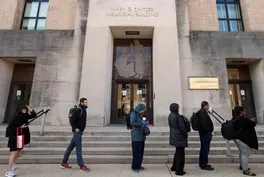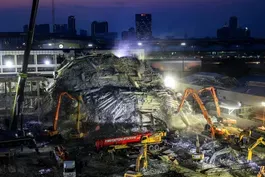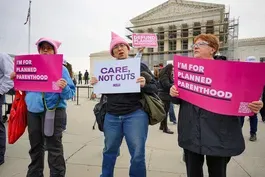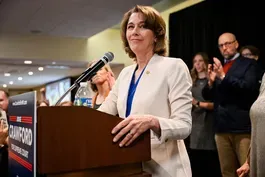
How Trump's tariffs could shake up U.S. and global economies
Clip: 4/2/2025 | 6m 46sVideo has Closed Captions
How Trump's sweeping new tariffs could shake up U.S. and global economies
President Trump escalated trade wars with a new set of sweeping tariffs for about 60 countries. During a speech in the Rose Garden, the president declared a national economic emergency as the legal justification for the new tariffs. Trump says tariffs will revitalize manufacturing in the U.S. Amna Nawaz discussed the move with Roben Farzad, economic analyst and host of Full Disclosure.
Problems with Closed Captions? Closed Captioning Feedback
Problems with Closed Captions? Closed Captioning Feedback
Major corporate funding for the PBS News Hour is provided by BDO, BNSF, Consumer Cellular, American Cruise Lines, and Raymond James. Funding for the PBS NewsHour Weekend is provided by...

How Trump's tariffs could shake up U.S. and global economies
Clip: 4/2/2025 | 6m 46sVideo has Closed Captions
President Trump escalated trade wars with a new set of sweeping tariffs for about 60 countries. During a speech in the Rose Garden, the president declared a national economic emergency as the legal justification for the new tariffs. Trump says tariffs will revitalize manufacturing in the U.S. Amna Nawaz discussed the move with Roben Farzad, economic analyst and host of Full Disclosure.
Problems with Closed Captions? Closed Captioning Feedback
How to Watch PBS News Hour
PBS News Hour is available to stream on pbs.org and the free PBS App, available on iPhone, Apple TV, Android TV, Android smartphones, Amazon Fire TV, Amazon Fire Tablet, Roku, Samsung Smart TV, and Vizio.
Providing Support for PBS.org
Learn Moreabout PBS online sponsorshipGEOFF BENNETT: Welcome to the "News Hour."
President Trump announced major new global tariffs today, 10 percent on all imported goods into the U.S., and he escalated trade wars with a second set of sweeping tariffs for about 60 countries.
AMNA NAWAZ: During a speech in the Rose Garden, he also issued retaliatory tariffs against many countries in response to what he called unfair trade practices involving trade barriers and other policies.
The rates varied considerably, but were quite high in some cases, including a 34 percent tariff on China, 20 percent for the European Union, 24 percent for Japan, and 46 percent for Vietnam.
The president called it an historic day and said the tariffs would revitalize manufacturing in the U.S. DONALD TRUMP, President of the United States: It's our declaration of economic independence.
For years, hardworking American citizens were forced to sit on the sidelines as other nations got rich and powerful, much of it at our expense.
But now it's our turn to prosper.
Jobs and factories will come roaring back into our country, and you see it happening already.
We will supercharge our domestic industrial base.
We will pry open foreign markets and break down foreign trade barriers.
AMNA NAWAZ: As part of today's announcement, the president declared a national economic emergency, which the White House says gives him the authority to impose the tariffs.
To help us understand more about all of this, I'm joined again by Roben Farzad, economic analyst and host of public radio's "Full Disclosure."
Great to see you here, Roben.
ROBEN FARZAD, Host, "Full Disclosure": Thank you.
AMNA NAWAZ: So let's just get your reaction to these announcements.
Big picture, is this better or worse than what folks were anticipating?
ROBEN FARZAD: It's slightly better than what people were expecting, but the headlines have been so volatile, and he's been shucking and jiving and changing directions and being positive about it and being bearish about it on other days.
So a lot was building up to April 2, so it could have been a lot worse.
AMNA NAWAZ: So the president held up that chart that we saw that was handed out to journalists as well.
It listed all the tariffs that have been imposed on the U.S. by each country and then the tariff that the U.S. would Levy in response.
What stood out to you about this when it comes to the president's approach to these tariffs?
ROBEN FARZAD: You know, I'm reminded of a tableau.
It was Bill Clinton, President Bill Clinton, I believe, in 1993, signing NAFTA.
And he was surrounded by Bob Dole, Al Gore, I think George Bush Sr.
There was so much unanimity over this new world order.
And we were approaching the other -- China entering the World Trade Organization, and the gains from trade that used to be something that a moderate Democrat and left-wingers and right-wingers could nominally agree on.
And here you have Trump, really with gusto, shattering that idea of new world economic order that's been building for the past 40 years.
And he did it in one fell swoop.
So there's no real playbook for this.
We could look back to the Depression and the Hawley-Smoot tariff and various other things that happened.
But we have never had anything just line up in one day just in staccato fashion like this.
And I'd be very curious to see what the reaction is from finance ministers across the planet and multinationals over the coming week.
AMNA NAWAZ: Yes.
Do you get a sense from what we know so far about what industries could be hardest hit and also what consumers should anticipate?
ROBEN FARZAD: Well, look at cars already, right?
I mean, everybody has been anticipating something coming down the pike.
We have already seen, as you and I have discussed before, significant inflation through the pandemic in car prices, what $40,000 or $50,000 can tell you.
And so much of this is perception and self-fulfilling prophecy.
If you're a car dealership or a chain of dealerships and you have only so many things on the lot and various things on a CSX rail car and other things on tankers coming over, you're going to covet that supply.
And there are going to be many people that are afraid and maybe want to pull forward a car purchase.
Again, what is an American car?
What is a Japanese car?
Many great Subarus are made in Indiana, right?
Volkswagen, Mercedes, Toyota, they have plants here in the United States.
There will be a tremendous amount of confusion and it might be like kind of buy first, ask questions later.
AMNA NAWAZ: So that baseline 10 percent tariff goes into effect pretty soon, midnight on April the 5th.
The other additional retaliatory tariffs go into effect about a week from now.
It's a pretty short timeline.
What does this mean for the countries and the companies impacted here in terms of what they can do to get ready?
ROBEN FARZAD: Well, a little bit nefariously, it provides some cloud cover to companies who want to hike prices.
We saw that.
They called it greedflation disdainfully during the pandemic.
But if you're in there and saying, well, we're more uncertain about our supply chain than we were last week, so we have an interest with our shareholders to hike the price.
I mean, any car dealership, if you're an American car manufacturer, you can hike prices in reaction to the expected hike.
And, indeed, the president himself said, let them hike.
Let the Big Three hike.
And you saw the head of the AFL-CIO said it's not so bad if he hikes.
So I'm worried about that echo chamber, that reaction.
But this has hit -- it's going to hit places like pharmaceuticals, shampoos, everyday products, certain produce items that you took for granted, or textile items and towels.
It's not easy to just turn around and reshore these jobs and these factories over the course of six months.
It takes years.
AMNA NAWAZ: We saw the president also mention in his remarks that his policies are bringing down inflation.
We should point out, in fact, that inflation has picked up in the first few weeks of the Trump administration.
But when you look at the tariffs and as they go into effect, what could be the impact on inflation ahead?
ROBEN FARZAD: Why wouldn't it add to inflation?
I don't understand.
It could become deflationary if everybody panics and stops spending.
And the Fed's like, OK, we got rid of inflation.
But that's a pretty blood-eyed move.
I mean, it's a roundabout way of destroying the economy.
There are easier ways of destroying the economy and getting interest rates down.
So that could arrest inflation.
But I have never seen that playbook before.
AMNA NAWAZ: There's also the underlying argument by the Trump administration here that there could be short-term pain, but this is for long-term gain, that this will spur domestic manufacturing in the United States.
Have you seen evidence of that anywhere?
Could it have that impact?
ROBEN FARZAD: You know, we did see since - - even in -- look at all the companies that have onshored here, especially in auto manufacturing, I'm not convinced that in lower-value added things such as textiles - - there used to be towel towns.
There used to be sofa towns in North Carolina.
It is brutally hard to bring those things back.
When you source the fiber and the labor and the railroad tracks that have been left abandoned for several years -- you go down the Eastern Seaboard and see these abandoned facilities.
It's not like you can just light them up over the course of two weeks.
I mean, this is a play that takes decades.
AMNA NAWAZ: Roben Farzad, host of public radio's "Full Disclosure," thank you so much for being here.
Great to have you here.
ROBEN FARZAD: My pleasure.
Thank you.
Cuts will grind HHS work to a halt, former secretary says
Video has Closed Captions
Important HHS services 'will grind to a halt' with cuts, former Secretary Sebelius says (8m 35s)
How private equity in health care is affecting patients
Video has Closed Captions
How private equity's increasing role in health care is affecting patients (8m 20s)
News Wrap: Myanmar earthquake death toll tops 3,000
Video has Closed Captions
News Wrap: Myanmar earthquake death toll tops 3,000 as civil war hampers relief efforts (6m 45s)
Supreme Court hears Planned Parenthood Medicaid funding case
Video has Closed Captions
Supreme Court case could decide if states can block Medicaid funding to Planned Parenthood (5m 39s)
West Philadelphia uses art to confront neighborhood problems
Video has Closed Captions
West Philadelphia uses art to confront neighborhood problems and threats to democracy (7m 4s)
What Florida and Wisconsin elections tell us about voters
Video has Closed Captions
What election results in Wisconsin and Florida tell us about voter sentiment (8m 33s)
Providing Support for PBS.org
Learn Moreabout PBS online sponsorshipMajor corporate funding for the PBS News Hour is provided by BDO, BNSF, Consumer Cellular, American Cruise Lines, and Raymond James. Funding for the PBS NewsHour Weekend is provided by...

















